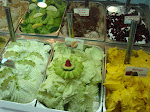If you happened to be a non-Jewish tourist in Israel this past week, you would have thought it quite peculiar that everyone is eating doughnuts.
What's up with that? I mean, I'm all about some hot Krispy Kremes myself, but not every day for 8 days straight!
Believe it or not, doughnuts have a special signifiance for the holiday of Hanukah. Here's how:
Legend has it, that over 2,000 years ago the Jews were kicking some major Greek tail in a pretty important battle. In doing so, the Jews reclaimed their Holy Temple, which had been totally defiled by the Greeks. And when I say defiled, I'm talkin'... nasty business -> Slaughtering pigs in the temple ain't pretty.
Meanwhile, the Jews were in a frenzy because their "Menorah" (see picture) only had enough clean, undefiled oil to burn for one night. This was a big deal because in the Holy Temple, the Menorah was supposed to burn throughout the night, every night.
But somehow... miraculously... the oil in the Menorah burned for 8 nights, and this gave the Rabbis enough time to find and prepare some fresh, clean, oil for the menorah.
Still wondering how those dang doughnuts come into the picture? Well you see, to celebrate the miracle of the oil lasting 8 nights, Jews celebrate this holiday by eating lots of foods cooked in oil, especially.... well... you guessed it, doughnuts!
... 8 nights of doughnuts, that is. :)
Sunday, December 20, 2009
Saturday, October 17, 2009
Super Sukkahs!
First of all.... WHAT is a sukkah??
A sukkah is a sort of tent. The plural for sukkah is "sukkot." Sukkot is also the name of a Jewish holiday which commemorates the time that the ancient Israelites wandered in the desert, sleeping in... none other than... sukkot!
And exactly why were they wandering in the desert? Well, they had just fled from being slaves in ancient Eygpt, where Moses, the leader of the Israelites, convinced Pharoah (after a number of very disturbing plagues) to "let my people go."
Once in the desert (Sinai) they slept and ate in temporary tents, or sukkot.
Today, Sukkot is a week long holiday which was celebrated just last week. For fun, families build sukkahs of their own, and sometimes sleep and eat inside of them during the week.
Pictured here is a my nephew Jackson is a minature sukkah I built for him.
Note that there is no fully covered roof on the sukkah... only branches. This is to remind people inside of the sukkah, as they look up and gaze at the stars, not only of the temporary outside shelters of their ancient ancestors, but also that life itself is temporary. Therefore, we should be thankful and joyful for all of our blessings.
A sukkah is a sort of tent. The plural for sukkah is "sukkot." Sukkot is also the name of a Jewish holiday which commemorates the time that the ancient Israelites wandered in the desert, sleeping in... none other than... sukkot!
And exactly why were they wandering in the desert? Well, they had just fled from being slaves in ancient Eygpt, where Moses, the leader of the Israelites, convinced Pharoah (after a number of very disturbing plagues) to "let my people go."
Once in the desert (Sinai) they slept and ate in temporary tents, or sukkot.
Pictured here is a my nephew Jackson is a minature sukkah I built for him.
Note that there is no fully covered roof on the sukkah... only branches. This is to remind people inside of the sukkah, as they look up and gaze at the stars, not only of the temporary outside shelters of their ancient ancestors, but also that life itself is temporary. Therefore, we should be thankful and joyful for all of our blessings.
Friday, October 16, 2009
Yom Kippur II: A Surprise Attack Breaks the Silence
On the holiest day in Judaism known as "Yom Kippur" (see Yom Kippur Part I in September archives), Syria and Egypt launched a surprise attack against Israel on October 6th, 1973.
It was a very strategic move for Egypt and Syria. Israeli men and women in the army reserves were home with family and friends, and most of them were fasting for the holiday. This left them with little energy to fight off not one, but two invading armies.
But miraculousy, they did.
Within three weeks, the Israeli Defense Forces (IDF) had sucessfully pushed back its attackers- crossing the Suez Canal on the Egyptian side, and advancing to within 20 miles of Damascus on the Syrian side.
(Note: At this time Israel already had control over the Sinai peninsula as a result of a previous war in 1967).
Monday, September 28, 2009
"Yom Kippur" Part I: The Sound of a Silent Nation
Right now, this very day, this very hour, Jews around the world and especially in Israel are observing the most holy and sacred holiday in Jewish and Israeli history.
This is "the day of atonement." The day that Jews repent of their sins to God, seeking his mercy, not his judgement on their lives for their actions and choices over the past year. This day is instituted in the book of Leviticus, Chapter 16: verses 29,30. It is written:
"In the seventh month, on the tenth day of the month, you shall afflict your souls, and you shall not do any work ... For on that day he shall provide atonement for you to cleanse you from all your sins before the L-RD."
To observe this holiday, typically Jews "fast" or refrain from eating or drinking (even water) for a 25 hour period. They do not work either. Basically, the whole country shuts down. All public transporation, restaurants, malls, stores... everything.
My most vivid memory from this holiday while I was in Israel, was the sheer and utter silence of the day from the complete shut down of all public life. ...... Well, this and the memory of my Jewish boyfriend telling me he hopes God doesn't judge him for dating a non- Jewish girl!
New Year's Already?
Thank goodness this gentile (me) still has time to make her New Year's Resolutions... but if I was Jewish, I would have celebrated "New Years" about a week ago.
The Jewish "New Years" is known as Rosh HaShanah. Here's a little Hebrew lesson to help you understand the name of the holiday: Rosh translates to "head," Ha translates to "the" and shana is the Hebrew word for "year." Put it all together and what do we have? The "head" (or 'beginning') of the year.
Rosh Hashanah is celebrated for two days because for Jews, it is too important of a holiday to be observed for just one day- this, after all, is the day commemorating God's creation of man.
Here's a fun fact about the holiday: people typically eat and pass out apples dipped in honey as a wish or blessing that friends and family will have a sweet, new year. :)
The Jewish "New Years" is known as Rosh HaShanah. Here's a little Hebrew lesson to help you understand the name of the holiday: Rosh translates to "head," Ha translates to "the" and shana is the Hebrew word for "year." Put it all together and what do we have? The "head" (or 'beginning') of the year.
Rosh Hashanah is celebrated for two days because for Jews, it is too important of a holiday to be observed for just one day- this, after all, is the day commemorating God's creation of man.
Here's a fun fact about the holiday: people typically eat and pass out apples dipped in honey as a wish or blessing that friends and family will have a sweet, new year. :)
Friday, September 4, 2009
Shabbat Shalom!
Take a look at this dinner table. All the food in these 10 plus casserole dishes is fresh and homemade. Nothing less would due, because tonight is a special night.
Tonight, friends and family gather together, just like they have each Friday night for the past.. well... 2,000 years. Talk about tradition!
The Jewish 'day of rest' known as 'Shabbat' begins this evening. Starting Friday afternoon, all stores and public transportation close down until Shabbat ends the following evening.
A typical Friday afternoon is thus spent stocking up on groceries to last through the weekend... perhaps going to the market and then gathering with loved ones for dinner (and in my case, taking a cab home afterwards because there are no buses running!) ;)
And of course, its not Shabbat without hearing the familiar Friday blessing from strangers and friends alike: "Shabbat Shalom" which essentially means, "Peaceful Shabbat." ;)
Tonight, friends and family gather together, just like they have each Friday night for the past.. well... 2,000 years. Talk about tradition!
The Jewish 'day of rest' known as 'Shabbat' begins this evening. Starting Friday afternoon, all stores and public transportation close down until Shabbat ends the following evening.
A typical Friday afternoon is thus spent stocking up on groceries to last through the weekend... perhaps going to the market and then gathering with loved ones for dinner (and in my case, taking a cab home afterwards because there are no buses running!) ;)
And of course, its not Shabbat without hearing the familiar Friday blessing from strangers and friends alike: "Shabbat Shalom" which essentially means, "Peaceful Shabbat." ;)
Monday, August 31, 2009
In Israel, Sunday is Monday!
I couldn't help but think as I sit here on a beautiful, relaxing, Sunday afternoon... that if I were back in Israel.. I'd be in class!
The Israeli work week goes from Sunday to Thursday... instead of Monday to Friday, like ours does.
The reason why is because in Israel, "Friday" marks the beginning of "Shabbat" which is the Jewish day of rest... kind of like OUR Sunday. (There will be more info about Shabbat later).
So basically, Our Sunday is like THEIR Monday... and THEIR Friday/Saturday is like OUR Sunday.
So if you are a practicing Christian in Israel, then you go to church on a SATURDAY, because Sunday is regular work day. Jews, likewise, go to the synagogue either on Friday night and/or Saturday morning. Interesting, huh?
The Israeli work week goes from Sunday to Thursday... instead of Monday to Friday, like ours does.
The reason why is because in Israel, "Friday" marks the beginning of "Shabbat" which is the Jewish day of rest... kind of like OUR Sunday. (There will be more info about Shabbat later).
So basically, Our Sunday is like THEIR Monday... and THEIR Friday/Saturday is like OUR Sunday.
So if you are a practicing Christian in Israel, then you go to church on a SATURDAY, because Sunday is regular work day. Jews, likewise, go to the synagogue either on Friday night and/or Saturday morning. Interesting, huh?
Subscribe to:
Posts (Atom)











